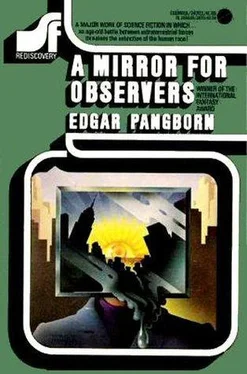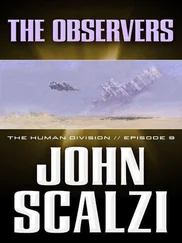I indicated the closed door. “What’s there?”
He leaned against it, perhaps to block me away with his mass. “One of my students, who should have lived to do his work.”
“Joseph Max? He took refuge here?”
“Refuge? No one was looking for him. He came to consult me, and he was stricken while he was here. The hospitals are already crowded, and have nothing to offer. It shouldn’t matter to you, Elmis. He’s dead.”
“Para….”
“Yes.”
“It’s fitting, I think…. The Organic Unity Party is dead too, Namir. Or will be soon. There may be some trouble down there at your office. A mob perhaps. At any rate the party will receive due credit for what’s happened. Did you think it could be any other way?”
“Why, I hadn’t thought.” He lifted and dropped his fat hands. I think he laughed a little. “It doesn’t matter where the credit goes, if the thing works, does it? The Party doesn’t matter — a tool useful once, thrown aside. Like myself — as you see, I have only a year or two to five.”
“Well, less than that. A year or so could be too long.”
“Vengeful, Elmis?”
“No. A matter of sanitation. I shouldn’t have fumbled, nine years ago.” He didn’t look interested. “If there’s anything you want to say to me, I’ll hear it. The laws require that much.” I showed him the automatic. “Sit down over there.”
He obeyed me, smiling dimly. With my left hand behind me I locked the door on the back rooms. He asked: “May I have a cigarette? I’ve become quite fond of them.”
“Of course. Just keep your hands in sight.” I tossed him a pack, and matches. “In the future as you saw it, you’d have had to keep a lot of human beings alive — you know, to cultivate food and tobacco, run a few machines, sweep the streets if you intended to have streets.”
Namir laughed in the smoke. “I never racked my head over blueprints. I only wanted to help get the creatures out of the way. The building of a sensible culture would have been for others — but as you say, they might have wanted to make human beings good for something.”
“I think you came to enjoy destruction as an end in itself, didn’t you? Any other ends you might have had at the beginning were swallowed up in the pleasures of smashing windows, tying a can to the tail of the poor human dog, chalking up words on blank walls. Is there any way I could show you that the pursuit of evil is a triviality?”
“You see it that way.” He shut his eyes. “I see, as I always have, that it was best to help men destroy themselves, because they aren’t fit to live.”
“Not fit, by whose decision? Whose scale of values?”
“Mine of course.” He was tranquil behind closed eyes. “Mine, because I see them as they are. There’s no truth in them. They project the wishes of a little greedy ape against the blank of eternity, and call it truth — there’s triviality if you like. They invent a larger ape somewhat beyond the clouds — or somewhat beyond the Galaxy, which is the same thing — and call it God; they use this invention as an authority, to justify every vice of cruelty or greed or vanity or lust that their small minds can imagine. They talk of justice, and say that their laws derive from a sense of justice (which they have never defined); but no human law ever derived from anything except fear — fear of the unknown, the different, the difficult, fear of man’s own self. They make war, not for any of the noisy noble reasons they produce, but simply because they hate themselves almost as much as they hate their neighbors. They gibber of love, love, but human love is merely one more projection of the ape-self, superimposed on the invented image of another person. They invent religions of charity such as Christianity — if you want to know how they practice them, look at the prisons, the slums, the armies, the concentration camps and execution chambers; better still, look into the not very well hidden hearts of the respectable, and watch the maggots squirm, the maggots of jealousy and hate and fear and greed. They are stupid, Elmis. They have always done their best to smother and destroy the few abnormal ones who have a little vision, a little ability beyond the ordinary, and they always will. Do you think Christ could live any longer in the twentieth century than he did two thousand years ago? Galileo recants again, Socrates drinks the hemlock again, every day of every year — but now there are three billion units in the swarm, in a smaller world, and they have learned simpler methods of crucifixion, without embarrassing publicity. The three billion crawl about, all over the helpless earth, destroying and defiling, killing the forests, polluting the air with smoke and radioactive dust and the torturing noises of the machine. In place of meadows, filling stations. The lakes are puddles of human filth. Two years ago the whole area of San Francisco Harbor was covered with dead fish: even the ocean is sick from the human taint, and this they call progress. I have done what I can, Elmis, and I hope you will make my death reasonably tidy. The floor of this room is some new kind of glass — the grenade won’t affect it. I always hated disorder.”
“You make a reasoned indictment,” I said. “I notice you put it all on abstract grounds. You must have had a more personal reason, to hate them as you do.”
“No.” His half-hidden Salvayan eyes watched me curiously, honestly, I think, temporarily interested in what I said. “No, I don’t believe so. As an Observer, I suddenly realized the blindness of Salvayan hopes, the futility of any effort depending on human nature. I abdicated because I saw that the only cure for the human situation was annihilation. Of course, once you declare war on the human race” — he shrugged amiably — “it tends to become a personal matter. Possibly my own vanity and ambition entered into it, after a while. Unimportant. Oh, I worked hard over Joe Max.” He yawned heavily. “I didn’t overlook the pitiful instability of creatures like Walker and Hodding — that was the material I had to work with, the chance I took…. As a favor to me, Elmis, would you spare me listening to the counsel for the defense, and use that gun now? I’m tired.”
“No defense. I admit almost every charge of the indictment. The only thing wrong with it is that it’s too partial, too trivial. You’ve spent your life hunting for counterfeit money in a pile of treasure. You looked for evil all your life, to prove your case — naturally you found it, and where it was absent you created it. Any fool can do that. I’ve looked for good in human nature and elsewhere, and found it, heaped up and flowing over. Anyone can do that too, though good may be a little harder to see, because it’s all around you, no further away than the nearest leaf, the nearest smile or pleasant word, no further away than every breath of air. You say there’s no truth in men. Do you know what truth is, any more than Pilate did? Human beings are in the early stages of trying to accept and understand empirical truth. It’s difficult. It’s like going into a jungle without weapons or foreknowledge. No other terrestrial animal ever tried it, or even guessed the jungle was there. Well, Namir, our views of man are not altogether different. We both see him as someone stumbling through that jungle. You want to slip a knife in his back because you don’t like him. I’d rather take his hand, knowing that he, and I, and you are all in the same jungle, and the jungle is only a small part of the universe. Justice? That’s an ideal, a light they see ahead of themselves, and try to reach. Certainly they stumble: because they try. If that weren’t so, they couldn’t even have invented the word. The same is true of their visions of love and peace. Fear goads them from behind, because they’re flesh and blood. If you blame them for being afraid, you’re only blaming them for being alive and capable of suffering. The products of fear — war, hate, jealousy, even greed develops from fear — those will diminish as fear diminishes, if they have a few more centuries to learn. Centuries are short for us, rather long for them, Namir. On the whole, I don’t think they’re much more stupid than Martians. As for the ugly aspects of their twentieth-century progress — another temporary sickness, I think, like the different sickness of, say, the ninth century, probably no more important. The earth will heal — my planet Earth, Namir, that might have been your planet too if you hadn’t blinded yourself with the very human sickness of hate — it will heal, when they learn how to live with it. Perhaps another century of learning how to control the machine—”
Читать дальше












